Hans Zimmer MasterClass Review:
Can It Teach Film Scoring?
Last updated on: August 4, 2023, Written by:
Bill Tremlon
Just a heads up, whenever possible, I use affiliate links in my reviews to help cover the costs of running this site. You can learn more here.

Hans Zimmer is the film score composer behind countless feature films like Sherlock Holmes, The Dark Knight, and Interstellar. I know a thing or two about creating music using Cubase. After seeing Hans Zimmer also play around with it in the trailer, I was intrigued to give it a start.
If you’re also eager to start the course but unsure about it, this Hans Zimmer MasterClass review is for you. I’ll be sharing my experience, covering how Hans Zimmer teaches film scoring, and whether it is engaging to help you determine if it’s the right course.

Contents
Hans Zimmer MasterClass Overview
Hans Zimmer’s film scoring MasterClass is great. It touches on all aspects of film music, from coming up with tunes to working with directors and musicians. What I loved about this course the most is he doesn’t engage in direct teaching. Instead, he inspires while instructing the essentials of film scoring.
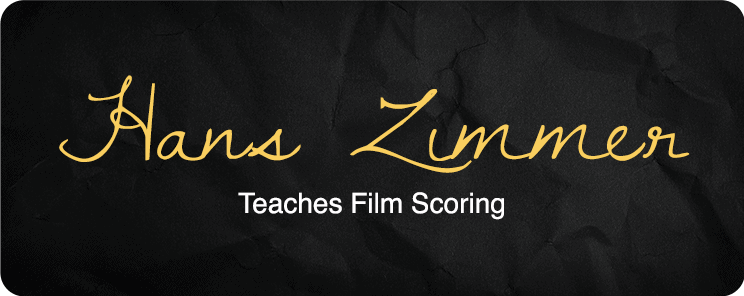
Hans Zimmer MasterClass Review Summary
| ⭐ Rating: | 9.0 ★★★★★ |
| 🥇 Category of class: | Music |
| 📈 Suits best for: | Artists wanting to learn film scoring and film enthusiasts to peek at how music impacts the filmmaking process |
| 🕒 Lenght: | 5 hours 40 minutes |
| ⏳ Avg. Lesson Duration | 13 minutes |
| 🛍️ Course Essentials: | A workstation and a synthesizer |
| 💼 Complementary material: | 55-page workbook with assignments |
| 📚 No. of Lessons: | 31 lessons |
| 🛒 Payment options: | Individual / Duo / Family |
| 💵 Price: | 10 – 20 $ (billed annually) |
| 🔄 Refund policy: | 30-day satisfaction guarantee |
| 🎁 Free trial: | ✅ |
Key Skills You’ll Learn
- Coming up with relevant tunes;
- Creating sound palettes;
- Finding the right tempo;
- Using the characters to create themes;
- Working effectively with directors and musicians;
- Incorporating feedback into your revisions;
- Overcoming challenges as a film score composer.
Who is Hans Zimmer MasterClass for
This course is perfect for anyone who wants to learn film scoring from Hans Zimmer. But it can be an eye-opening experience if you’re pursuing a career in music or another film-related discipline. With an all-access pass to MasterClass, you will get inspired and witness the composing process of arguably the best film scorer.
Our Evaluation
Total score: 9.0
PROS
CONS
In This Hans Zimmer’s MasterClass
Review, You’ll Learn
Hans Zimmer MasterClass Instructor Review
About Hans Zimmer
There isn’t a film scorer as accomplished as Hans Zimmer. Many, especially Hans Zimmer fans, consider him the best film scorer the motion picture industry has ever seen. I can’t blame them, as Hans Zimmer’s work speaks for itself. The Dark Knight, Lion King, Gladiator, Pirates of the Caribbean, and Sherlock Holmes are just a few of the well-known feature films he’s been a part of.
Hans Zimmer has been active in the industry since the late 80s. And throughout his career, he received numerous awards, including two Academy Awards and three Golden Globes. Most recently, he won the Academy Award for Dune.
Hans Zimmer as an Instructor
Hans Zimmer starts his film scoring MasterClass by humbly admitting that he may struggle with words. He also acknowledges his German background, saying he’s on thin ice with language. Despite this, Hans Zimmer did an excellent job teaching music composition.
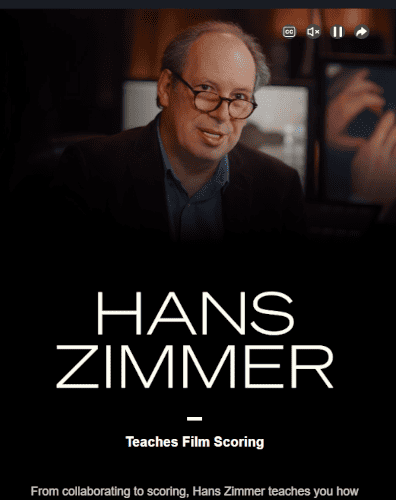
There were parts I couldn’t wrap my head around his ideas about music composition, but he thankfully provided plenty of examples and practical tips to my rescue.
Overall, Hans Zimmer teaches film scoring in a simple manner. However, he throws terms like octave, rubato, and tempo. These can get confusing, even for someone with experience in electronic music production like me. I recommend pairing the class guide with the Hans Zimmer MasterClass videos to get the most out of this course.
About MasterClass
Since 2015, MasterClass brings 180+ online classes from top-tier instructors in almost any field. It includes pre-recorded video lessons from masters such as Richard Branson, Martin Scorsese, Aaron Sorkin, Gordon Ramsay, and many others.
The video quality equals Hollywood movies, and every MasterClass course is carefully structured. But that’s not all. There are interactive assignments, MasterClass community activities, and an ever-growing video library to enjoy. The sheer amount of content can make it hard to begin. Cursums will help you to choose wisely.
Uniqueness and Freshness of the Content
It isn’t only his MasterClass where you’ll see Hans Zimmer composing music for films. The YouTube videos, the behind-the-scenes from the DVDs, and his interviews can give you a sneak peek as well. However, these resources are incomplete and won’t teach you much compared to Hans Zimmer’s film composition course.
There are undoubtedly a few notes worth taking, but a MasterClass with Hans Zimmer is more valuable for aspiring artists that want to learn more about film scoring.
There are also relevant courses on Masterclass that can broaden your perspective on movie scoring. Producer Martin Scorsese’s lessons on filmaking can build on top of what you learned from Hans Zimmer’s guide You can watch them, plus other courses, like exploring thrilling ideas with David Lynch with an all-access pass to MasterClass.
Hans Zimmer MasterClass Content and Structure Review
Hans Zimmer’s music production MasterClass is 5 hours and 40 minutes long. It’s a detailed course that teaches film scoring in 31 lessons. Some lessons provide insights into music theory and writing songs, while others present Hans Zimmer’s creative process.
The lessons are a mix of guides on film scoring and reviews of Hans Zimmer’s work. Throughout the course, he breaks down the essentials every film composer should know and complements them with ways to utilize them, like creating themes for characters like Jack Sparrow.
The class guide takes it further by giving you film score assignments. The homework in Hans Zimmer’s course on scoring soundtracks ranges from creating sound palettes for your favorite city to using a metronome to identify the tempo of a scene.
Themes and Story
1-3 Lessons Summary
Hans Zimmer begins his film scoring MasterClass by laying the foundation with themes and stories. He gives simplicity as his best tool for creating memorable tunes and encourages film composers to ask questions and use answers to drive the theme forward.
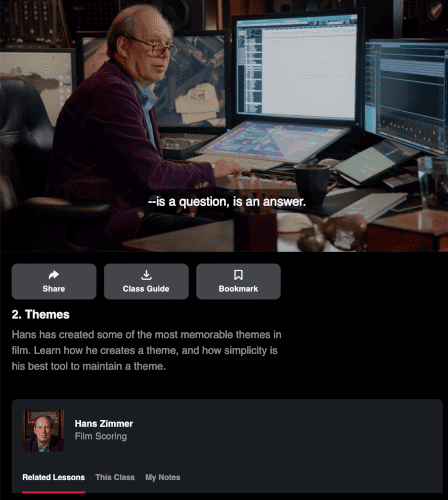
Hans Zimmer then prepares the next section reviewing the differences between speaking to the director and reading the screenplay. He uses the differences in Interstellar script and how Christopher Nolan portrayed the story during the scoring process as an example. The key takeaways from this section were asking questions and composing music connected to the narrative.
Working With Directors
4-6 Lessons Summary
This section is made up of three consecutive lessons that teach bringing the director’s vision to ears. He also briefly talks about working with other production members and reveals that he’s in the Gladiator cutting room for this MasterClass, which only increased my excitement for it.
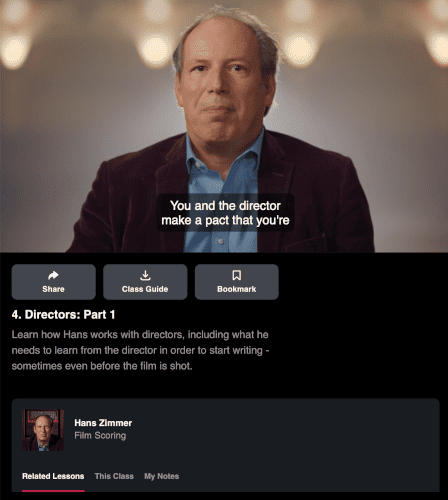
I found these three lessons to capture life as a music producer in the film industry perfectly. You get practical tips on building a good relationship with the director. Plus, it describes the role of other production members and how it relates to film composers.
Essentials of Film Scoring
7-10 Lessons Summary
The next batch of lessons is where you will learn more about the technical aspect of film scoring. Hans demonstrates the importance of sound palettes, scoring with synths to create abstract sound, understanding which scenes need music and scoring accordingly, and using music as a dialogue.
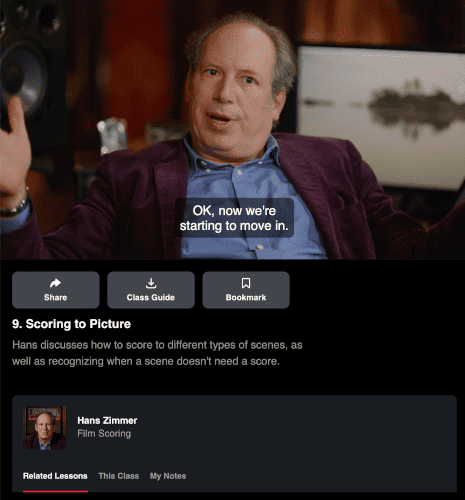
These are explained as essentials every film scorer should know. With the previous lessons, the course gives you an idea of how you can compose music for the story, different scenes, and dialogue.
Tempo and Music Diaries
11-13 Lessons Summary
This part is all about the tempo and creating music diaries. Hans touches on the importance of tempo and gauging the editor’s rhythm to enhance the sonic immersion for the audience. In these lessons, Hans Zimmer explains the musical journey of rhythm and how it can change or stay consistent throughout one scene.
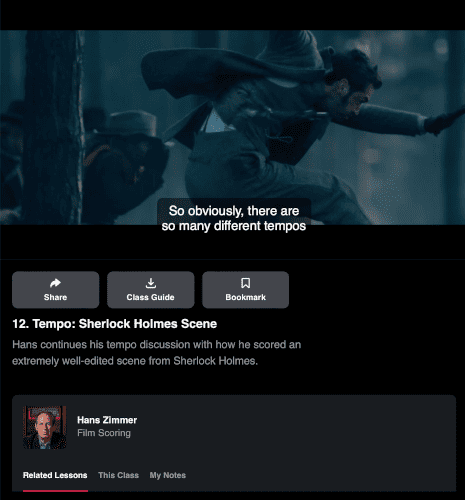
This chapter ends with Hans Zimmer’s music diary for Sherlock Holmes while Hans makes a point about the benefits of creating them for each film. It’s an insightful way to end this part, where you’ll be encouraged to do the same for your own music projects.
Character Theme
14-17 Lessons Summary
The lessons on creating character themes were my favorite part of the film scoring MasterClass by Hans Zimmer. For more in-depth character development lessons, I highly recommend checking out actor Samuel L. Jackson’s lessons. In Zimmers classes, you get to witness the exceptional music composer’s creative process as he composes themes for characters, offering valuable insights into what makes him a renowned composer. This section was entertaining, partly because of the Character Theme lessons that look at Batman, The Joker, and Jack Sparrow.
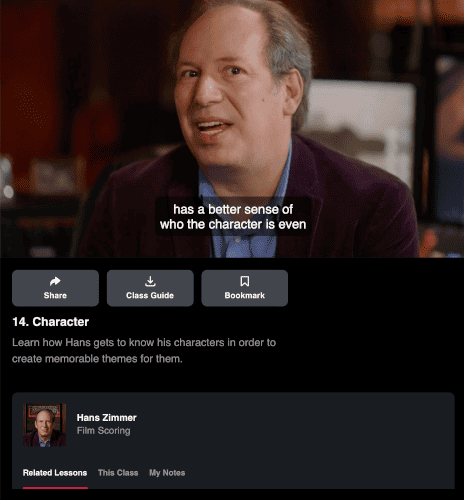
In each, Hans Zimmer teaches something new, like recognizing when to stop music and tensing and relaxing the audience. I found the lesson on the Batman score extremely helpful. It taught me various ways to use my own style while incorporating insights from Hans Zimmer’s stories.
Case Studies
18-19 Lessons Summary
There are case studies of Frost/Nixon and The Dark Knight in this quick section that summarizes pretty much everything discussed in the course so far. It does a good job honing all the topics, from scoring to story to understanding characters.
If the course was easy to follow for you until this point, you can skip these two lessons.
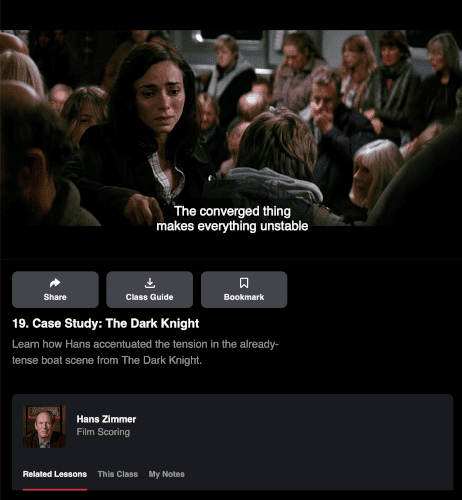
Working With Musicians
20-22 Lessons Summary
In these lessons, you see sincerity coming out of an Academy award winner. He goes over his casting process and points out that you don’t need a big symphony orchestra and recording orchestral music to have a good film score. Zimmer critically stresses that it’s all about finding the right musicians, whether they are your friends or aspiring artists you’ve met.
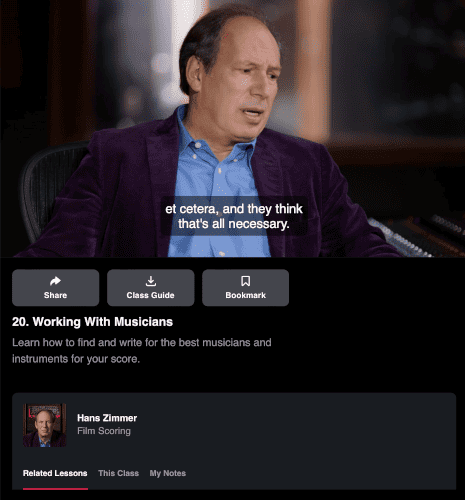
These lessons give general tips on working with musicians and the differences between some instruments and orchestras. While these are the primary points, Hans also makes remarks on effective communication with musicians.
Incorporating Feedback and Tips for Writing Music
23-28 Lessons Summary
Hans Zimmer shares his process on incorporating feedback and rewriting effectively. The music composer shares plenty of ways to present the score to the audience and gauge their reaction to determine if it’s working or not.
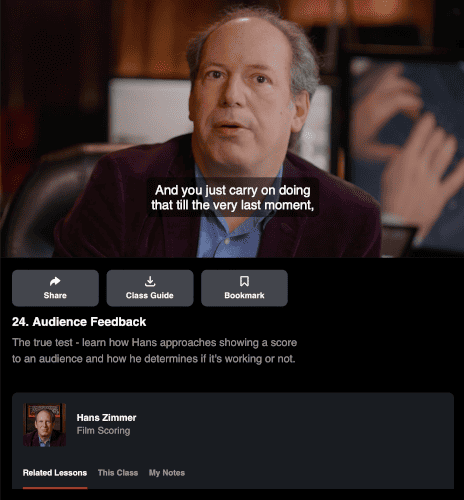
He further enhances this section with his writing tips. The two lessons dedicated to writing music were extremely practical. I’m sure you’ll find it beneficial whether you’re into film scoring, concert music, classical music, or a related discipline.
Closing
29-31 Lessons Summary
Hans Zimmer wraps up his MasterClass with common challenges you might face as a film composer. He also touches on the importance of a work-life balance and how that can benefit your creative process. Although this course teaches music for films, much of his tips in the closing lessons can help anyone pursuing arts.
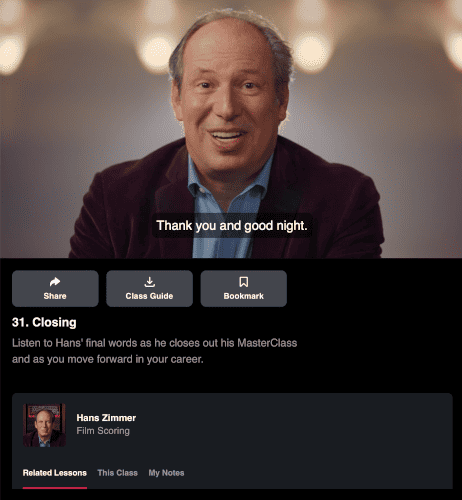
Fast-Track Lesson Plan
Finish Hans Zimmer MasterClass in 3 hours, 1 minute, and 53 seconds.
| No. | Lesson | Duration |
| 2. | Themes | 15:50 |
| 3. | Story | 10:12 |
| 4. | Directors: Part 1 | 9:35 |
| 6. | Directors: Part 3 | 6:46 |
| 7. | Sound Palettes | 17:31 |
| 9. | Scoring to Picture | 9:49 |
| 10. | Scoring Under Dialogue | 9:12 |
| 11. | Tempo | 9:42 |
| 12. | Tempo: Sherlock Holmes Scene | 3:58 |
| 14. | Character | 8:04 |
| 15. | Character Theme: Batman | 9:59 |
| 17. | Character Theme: Jack Sparrow | 10:34 |
| 21. | Working With Musicians | 15:13 |
| 23. | Feedback & Revisions | 9:38 |
| 24. | Audience Feedback | 11:37 |
| 25. | Writing Tips: Part 1 | 16:26 |
| 29. | Life as a Composer: Part 1 | 7:07 |
Hans Zimmer MasterClass Student Engagement and Retention
I found Hans Zimmer to be an overall good teacher. However, there were parts where I relied heavily on listening to what he had to play to understand some topics. For example, I couldn’t wrap my head around how tempo could lead the scene until I watched the Sherlock Holmes scene.
What made Hans Zimmer a good teacher for me was his instructions. Every guide and tip he presented was clear and easy to understand. Although some lessons got technical, like using synths and tempo, he delivered points effectively.
My Personal Experience With Hans Zimmer MasterClass
Things I Liked About the Hans Zimmer MasterClass
Hans Zimmer’s Teaching Style
Hans Zimmer is a friendly, relatable, and joyful teacher. Throughout the course, he takes you back to his younger days, relating to the students watching his MasterClass. The lesson, Hans’ Journey, is full of this type of content.
Lessons Inspire You
Almost every lesson in Hans Zimmer’s MasterClass left me with inspiration. Even though it didn’t leave me with enough to fire up and pursue a music career, it touched the creative part in me. It’s a MasterClass that inspires you to take action on the creative goals you’re aiming to achieve.
Applicable to All Music
The title of this course is Hans Zimmer teaches film scoring. MasterClass may want to give it a second thought as it goes beyond it. It’s full of advice and teachings applicable to other music disciplines. Whether interested in film scores or electronic music, Hans Zimmer might teach more than you expect.
Things I Didn’t Like About the Hans Zimmer MasterClass
Not a Tutorial to Film Scoring
Don’t get me wrong – Hans did an excellent job teaching film scoring. This Hans Zimmer MasterClass review can approve that. However, it isn’t exactly a how-to course where you’ll learn film scoring from start to finish. It’s a course where Hans Zimmer shares his process while giving you tips. It’s something to note for those looking for a structured lesson plan.
Some Lessons Are Hard to Grasp
The majority of the course was easy to follow, but some parts required more from Hans Zimmer to explain. The Character lesson is a good example of this. He explains knowing the characters and creating music for them, but that’s about it. Luckily, overviews and case studies often follow these lessons to help students understand.
Is Hans Zimmer MasterClass Worth the Money
Cost of Hans Zimmer MasterClass
When this MasterClass was initially released, the platform required members to purchase it as an individual course. However, since then, MasterClass has transitioned to a subscription-based payment model. With an all-access pass to MasterClass, which includes Hans Zimmer’s course along with 180+ others, ranging from photography classes with Annie Leibovitz to racing with Hamilton and even learning magic with Penn and Teller (Yes, MasterClass offers a diverse range of topics!), you can now enjoy unlimited access. The subscription cost ranges between $10 and $20 per month with an annual subscription.
| Plan | Price |
| Individual (one device) | $10 per month |
| Duo (two devices) | $15 per month |
| Family (six devices) | $20 per month |
If you were to ask if this course is solely worth purchasing or gifting a MasterClass subscription, I’d say yes! Even if you’re not a music fan, it will give you insights into the creative process of someone who’s arguably the best in his field.
Does the Class Keep Its Promises
For anyone who wants to learn about film scoring, Hans Zimmer’s MasterClass is worth it 100%. The class covers everything you need about film scores and provides detailed insights into Hans Zimmer’s process. It teaches the essentials of film scoring and reinforces it with Hans Zimmer’s work.
Although it’s not exactly a how-to class with a step-by-step guide on making film music, it’s a course with rich learning materials taught by one of the best film scorers.
Hans Zimmer MasterClass: What Others Have Said
Hans Zimmer MasterClass rating is high all over the internet. It’s by far one of the most-liked MasterClass courses on music. Here’s what others have had to say.
An artist sharing how he was inspired to make original music after finishing Hans Zimmer’s MasterClass.

Here’s a Reddit user recommending it to everyone – regardless of their style of music.
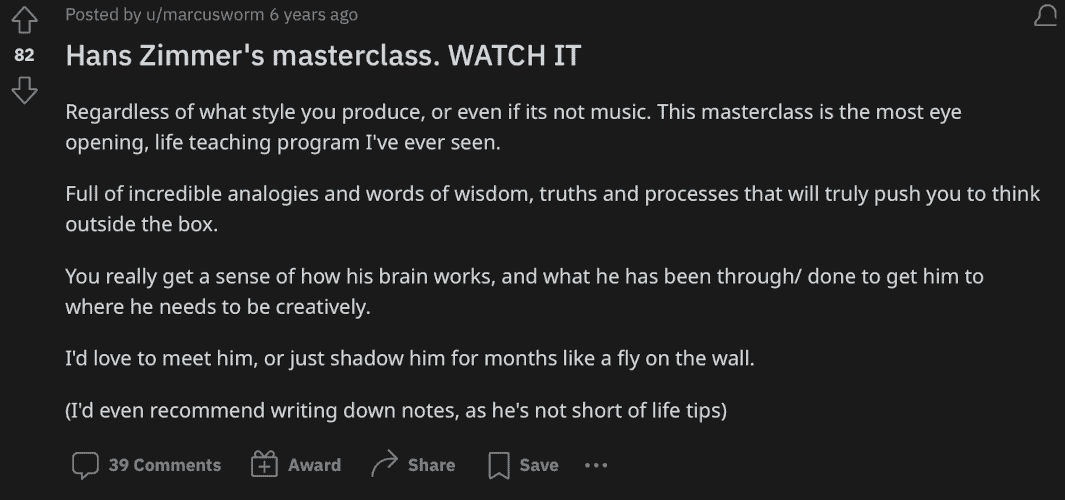
A Facebook user made his original soundtrack music all from what he learned from this MasterClass – truly remarkable!
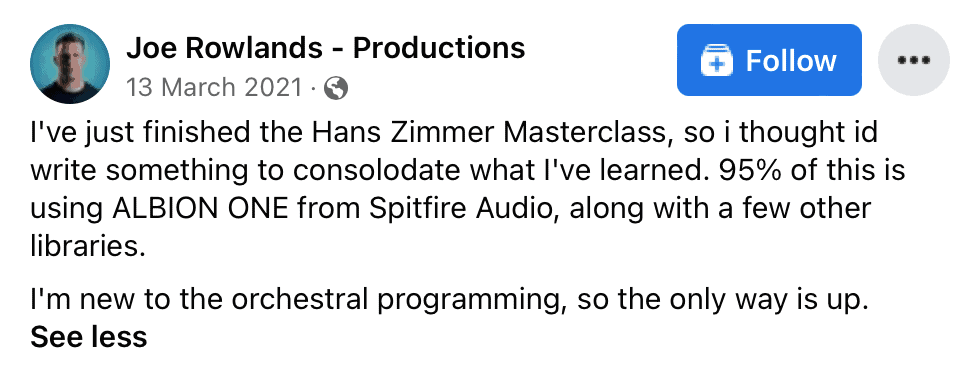
Essentials Used in the Hans Zimmer MasterClass
To start Hans Zimmer’s MasterClass, you will need a DAW (Digital Audio Workstation), like Ableton Live or FL Studio, and a synthesizer. These are the essentials of this MasterClass. For what DAW Hans Zimmer uses, check the FAQs.
Alternatives to Hans Zimmer’s MasterClass MasterClass
Other Music Courses Available on Masterclass
- Danny Elfman’s Masterclass on film scoring
- Armin Van Buuren MasterClass on Dance Music
- Timbaland MasterClass on Producing and Beatmaking
- Christina Agulera MasterClass on Singing
- Usher MasterClass on the art of performance
- Ringo Starr MasterClass on Drumming and Creative Collaboration
- Metallica MasterClass on being a band
- Carlos Santana MasterClass on The art and Soul of Guitar
- John Legend MasterClass on Songwriting
Alternatives to MasterClass
Udemy
Udemy is one of the most popular online learning providers, with a massive choice of various classes. The learning platform covers a range of music and film courses for beginner and advanced learners.
Coursera
Coursera is another big name in the online courses market, with a lot to offer in music-related fields. It’s a great way to expand your knowledge without spending much money on online learning.
Skillshare
Skillshare focuses on practical courses, with educational videos substituting expensive college courses. The aim is to provide users with marketable skills for finding a job. There are some courses related to creating your own music and movies as well.
Q&A about Hans Zimmer MasterClass

Blogger | Life-long learner
Bill Tremlon
I’ve spent the last ten years passionately studying various online learning platforms. Udemy, MasterClass, Coursera, and Skillshare are the main ones, but I review lesser-known study tools as well. I test and analyze each course and lesson thoroughly before sharing my research.

Blogger | Life-long learner
Bill Tremlon